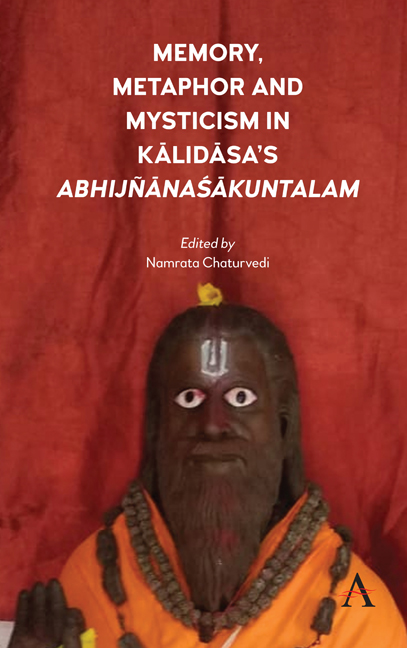Introduction
Published online by Cambridge University Press: 23 February 2022
Summary
Ramyāni vīkshya madhurāņshca nishamya shabdān
Paryutsukībhavati yatsukhitopi jantuh
Tacchetasā smarati nunamabodhapūrvam
Bhāvasthirāni jananāntarasauhradāni
(AbhijñānaŚākuntalam, V.2)[Why do I feel a sense of anxiety even though Ihaven't suffered separation from my loved one? Onseeing beautiful things, on hearing melodiousmusic, there is a sukkha that is pervaded by pastmemories.]
In the opening of the fifth act, just before thearrival of Śakuntalā to his court, Duṣyantaattributes his anxiety on hearing Hansapādika's songto memories that are passed on through births. Healso points out that engagement with art makes thestirring of these memories possible.
Sri M, a living nāthyogi, in one of his satsangas (assembly of truth) describes,‘All experience is [as] a memory.’ The need to storememory to be accessed again through sensorial formsis the consequence of the inability of humanconsciousness to realize truth. While one clings tothe belief in the eternality of images, one is boundby the cycle of coming and going, living and dying.While a sensorial or pneumonic token is needed toprove existence, an individual is merely looking atappearance and denying herself the possibility ofreal witnessing. When Duṣyanta gives his ring to hisbeloved after a haunting episode of sensual lovebetween the two, their relationship reaches a stageof spiritual deadlock. From this point, until theycan be fully liberated, Duṣyanta and Śakuntalā willfind themselves playing a game of hide-and-seek withthe token (ring) evading them. Duṣyanta has toundergo a test through emotional cleansing as he hasto experience remorse and guilt, while Śakuntalā hasto undergo the heartbreaking experience of birthingand raising a son without his father. In hisremorse, Duṣyanta tries to apprehend the form ofŚakuntalā again and again by recreating her pictureand invoking the brhamar and Mālati vine. He is stillcaught in the web of form, and he will next seeŚakuntalā only when she has passed through anotherstage of life, that is, child birth. It had to fallupon Ŗshi Durvāsas, anembodiment of Śiva's anger, to bless the two(sleeping) lovers with real awakening. WhileŚakuntalā was unaware of herself by being lost indesire and doubt, the sage brings about a state ofsmriti avarodh, orobstruction of memory, in Duṣyanta's citta (consciousness).
- Type
- Chapter
- Information
- Publisher: Anthem PressPrint publication year: 2020



